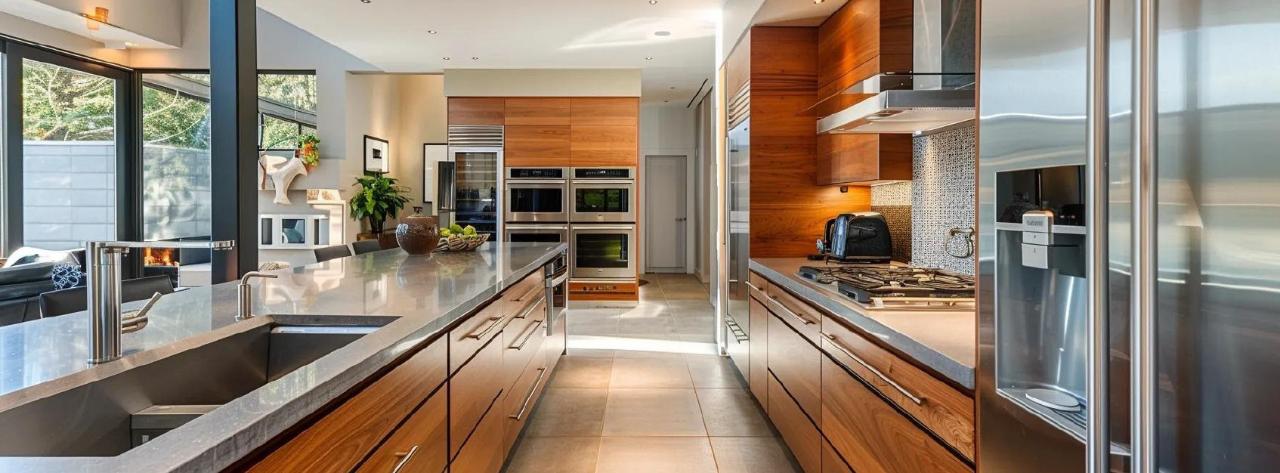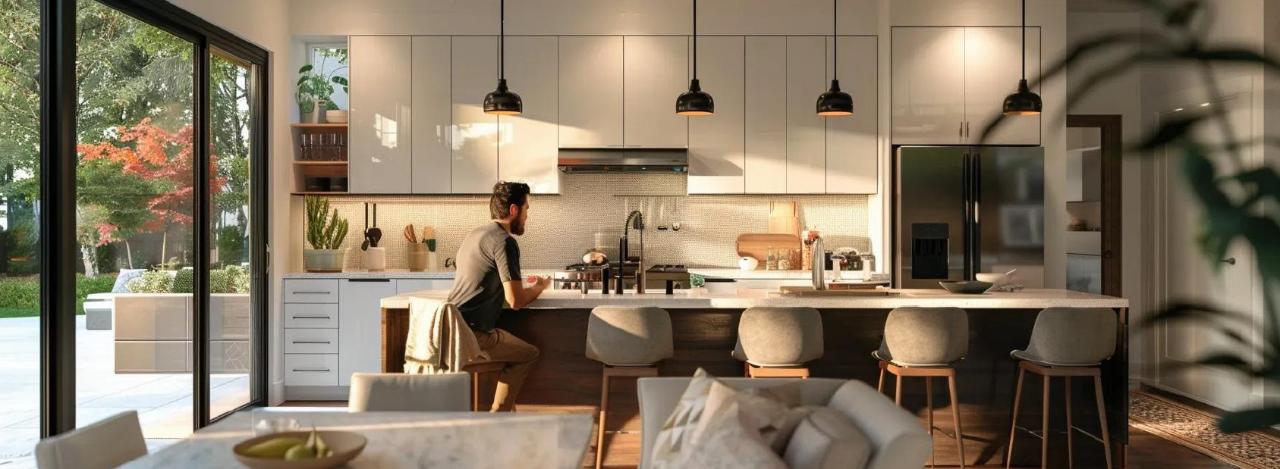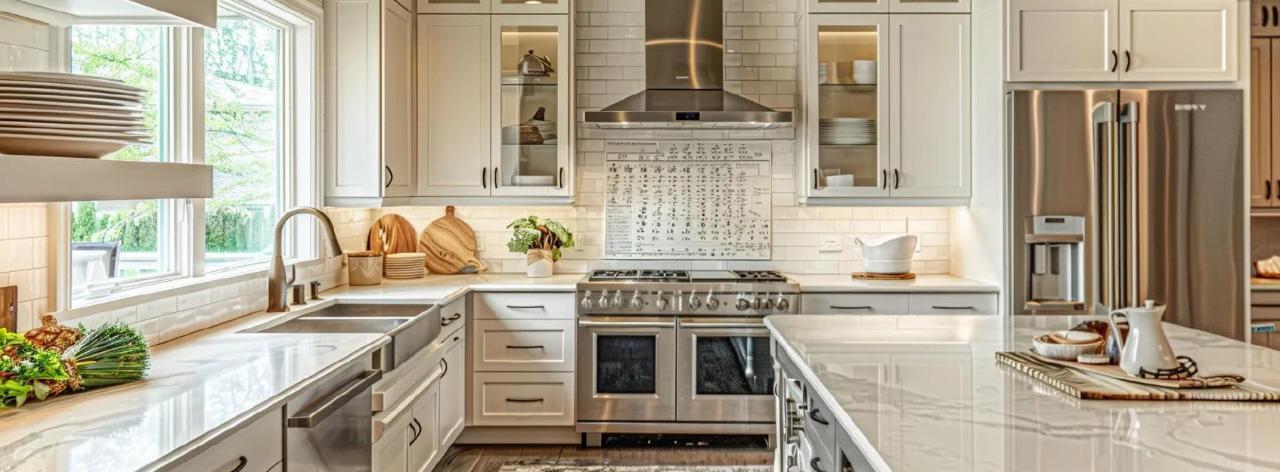How to Prepare for a Kitchen Remodel:
Essential Steps and Expert Tips
Essential Steps and Expert Tips
How to Prepare for a Kitchen Remodel: Essential Steps and Expert Tips
A kitchen remodel transforms the heart of your home into a space that blends functionality,
style, and efficiency. For quality-conscious homeowners, careful planning—from setting a
realistic budget and choosing design ideas to selecting reliable contractors—is essential to
ensure every dollar and minute is well spent. With proper planning, you can avoid unexpected
costs, delays, or design issues that diminish your return on investment.
This article outlines key budgeting tips, innovative design ideas, realistic renovation timelines,
and the process of choosing the right contractor. It also offers guidance on project
management and preparing your home and family for the remodel, ensuring you create a
stylish, efficient, and safe space that adds value to your home.
Transitioning from planning to execution requires a clear understanding of your finances,
design priorities, and project management. Let’s explore the essential areas to consider.
How Do You Set a Realistic Kitchen Remodel Budget?
Begin by analyzing your current kitchen and discussing your financial limits. Identify all
remodel elements—cabinets, countertops, flooring, appliances, and labor—and gather
multiple estimates. This helps prevent overspending and ensures you prioritize essential
features. When funds are limited, consider affordable alternatives such as RTA kitchen
cabinets or cost-effective laminate countertop options without sacrificing style.
How to Account for Unexpected Costs in Your Budget?
Set aside at least 15% of your total remodel budget for unforeseen issues such as plumbing
or electrical problems. Exploring fixed-price contracts can further protect you from sudden cost increases.
What Are the Best Kitchen Design Ideas to Consider Before Remodeling?

Successful kitchen design balances aesthetics and functionality. Modern kitchens emphasize
clean lines, open spaces, and balanced design. Analyze your daily routines to choose a layout
that optimizes traffic flow and storage. Whether you prefer minimalist or eclectic styles, the
design should seamlessly integrate with your overall home décor, using quality elements like
stainless steel appliances, wood finishes, or concrete accents. This is where having a
professional designer will help you plan a kitchen that works for your lifestyle.
clean lines, open spaces, and balanced design. Analyze your daily routines to choose a layout
that optimizes traffic flow and storage. Whether you prefer minimalist or eclectic styles, the
design should seamlessly integrate with your overall home décor, using quality elements like
stainless steel appliances, wood finishes, or concrete accents. This is where having a
professional designer will help you plan a kitchen that works for your lifestyle.
How to Choose a Kitchen Layout That Fits Your Space?
The classic work triangle—linking the sink, stove, and refrigerator—remains the foundation
for efficient kitchen design. Consider open-plan, galley, L-shaped, or island-based layouts
based on available space. Open-plan kitchens create an inviting atmosphere for entertaining,
while galley layouts maximize efficiency in smaller spaces. Detailed floor plans and expert
advice can help determine the optimal layout for your kitchen project.1
How to Select Appliances and Fixtures for Your New Kitchen?
Balance performance, style, and efficiency when choosing appliances and fixtures. Compare
energy ratings, warranty periods, and technological features. Stainless steel finishes and integrated appliances promote a sleek, modern look, while choosing durable yet easy-tomaintain products ensures long-term reliability. Create a comparison chart for items such as
ovens, dishwashers, and refrigerators to ensure every selection meets your lifestyle needs and
design vision.
How Long Does a Typical Kitchen Renovation Take?
The duration of a kitchen renovation depends on the remodel's scale, materials, and
complexity. Minor updates might take only a few weeks, but full-scale renovations typically
extend over several months. Proper planning and coordination—including securing permits and
scheduling contractors—are key to staying on track.
What Is a Realistic Kitchen Renovation Timeline?
A realistic timeline often spans 2 to 4 months. Initially, allocate a few weeks for design and
planning to finalize drawings, material selections, and budgets. Once construction starts,
demolition and system installations (electrical, plumbing, HVAC) occur in the first few weeks,
followed by cabinet, countertop, and appliance installations over the next 4 to 6 weeks. Always
include a buffer period to address any unforeseen delays or final touch-ups.
planning to finalize drawings, material selections, and budgets. Once construction starts,
demolition and system installations (electrical, plumbing, HVAC) occur in the first few weeks,
followed by cabinet, countertop, and appliance installations over the next 4 to 6 weeks. Always
include a buffer period to address any unforeseen delays or final touch-ups.
How to Plan Your Remodel Around Your Daily Routine?
Plan your remodel around your daily routine to minimize disruption. Set up a temporary kitchen
in another area of the house to maintain meal preparation. Schedule major work during less
busy periods such as vacations or weekends. Communicate clearly with your contractor about
work hours and milestones, and plan meals ahead or arrange dining out services during the
most disruptive phases of the remodel.
What Are Common Delays in Kitchen Remodel Projects?
Common delays include material shipment issues, unexpected structural problems, and
coordination challenges among subcontractors. Design changes and permitting delays,
particularly in older homes, can also extend the timeline. Mitigate these risks with flexible
scheduling, backup suppliers, and regular contractor communication to catch and address
delays promptly.
How Do You Choose the Right Contractor for Your Kitchen Remodel?

The success of your kitchen remodel hinges on choosing the right contractor. Evaluate past
work. Look for clear communication regarding timelines, materials, and costs. Seek testimonials
from previous clients. A contractor experienced in similar projects—especially those focused
on stylish yet practical designs—will navigate unexpected hurdles with ease.
work. Look for clear communication regarding timelines, materials, and costs. Seek testimonials
from previous clients. A contractor experienced in similar projects—especially those focused
on stylish yet practical designs—will navigate unexpected hurdles with ease.
What Questions Should You Ask Potential Kitchen Remodel Contractors?
Ask about project timelines, crew expertise with high-end materials (like quartzite countertops
or frameless cabinets), and how they manage issues like water damage or design changes.
Inquire about their project management style, communication frequency, and scheduling
practices. Request detailed written estimates, warranty information, and client references.
These questions help you assess reliability, experience, and transparency, ensuring there are
no surprises later in the project.
What Are the Benefits of Hiring a Full-Service Kitchen Remodel Company?
A full-service remodel company manages everything from design and material selection to
construction and project management. This unified approach reduces the stress of
coordinating multiple subcontractors and ensures a consistent vision throughout the project.
Full-service companies often offer warranties, post-project support, delivering clear
communication and a streamlined remodeling experience.
What Are the Most Common Kitchen Remodel
Mistakes to Avoid?
Mistakes such as poor planning, mismatched materials, cost underestimations, and neglecting
disruptions can strain your budget and extend the remodel timeline. Even minor oversights,
like incorrect measurements or failure to update plumbing or electrical systems, can lead to
significant complications. Recognizing these pitfalls early and planning for them with
professional guidance helps ensure overall satisfaction with your remodel.
How Can Poor Planning Impact Your Kitchen Remodel?
Without a detailed blueprint covering every phase—from demolition to final finishes—
unexpected issues are likely to arise. Rushed decisions or constant design changes can result
in mismatched styles, expensive reworks, and delays. Establish clear project expectations,
develop a comprehensive schedule, and maintain open communication with your contractor to
reduce risks related to poor planning.
How Can Project Management Improve Your Kitchen Remodel Experience?

Effective project management is crucial for staying on schedule, within budget, and
maintaining quality throughout your remodel. A dedicated project manager coordinates
contractors, monitors progress, and handles unforeseen challenges so you can focus on the
design. Using digital tools to track tasks and budget helps ensure every detail is addressed in
real time.
maintaining quality throughout your remodel. A dedicated project manager coordinates
contractors, monitors progress, and handles unforeseen challenges so you can focus on the
design. Using digital tools to track tasks and budget helps ensure every detail is addressed in
real time.
What Role Does a Dedicated Project Manager Play?
A dedicated project manager schedules work, coordinates with suppliers and contractors, and
manages changes during the remodel. They provide regular status updates to quickly identify
and solve issues, reducing downtime and preventing cost overruns. This focused management lets you concentrate on design choices while ensuring that every aspect of the remodel aligns with your vision.
How to Communicate Effectively During Your Remodel?
Establish clear expectations and schedule weekly check-ins with your project manager and
contractor. Use digital tools like project management software and shared calendars to keep everyone informed. Regular face-to-face or virtual meetings, accompanied by written
documentation of changes, help prevent misunderstandings and keep the project on track.
How to Prepare Your Home and Family for a Kitchen Remodel?
Prepare your home and family to minimize disruptions during the remodel. This involves
planning logistical changes, setting up temporary living arrangements, and protecting your
belongings. Consider how the remodel will affect daily routines like cooking and dining, and
communicate plans clearly with all family members.
planning logistical changes, setting up temporary living arrangements, and protecting your
belongings. Consider how the remodel will affect daily routines like cooking and dining, and
communicate plans clearly with all family members.
What Steps Should You Take to Protect Your Home During Construction?
Cover valuable items and fragile furnishings with durable plastic or drop cloths, and install
temporary barriers to separate the work area from living spaces. Verify that you have insurance
to cover any potential damage, and use sealant tape on door frames or windows to limit dust
and debris exposure.
If you hire a full service remodeler, they should take care of these concerns with a comprehensive dust mitigation strategy. Highlands Remodeling sets up plastic dust barrier
walls, uses an air scrubber during the dustier portions of the remodel, and protects floors
leading in to the workspace.
How to Set Up a Temporary Kitchen Space?
Choose an unused room or area in your home and equip it with a microwave, mini-fridge, and
simple countertop. Add storage for basic utensils and ingredients, and consider portable
appliances like electric hot plates or toaster ovens. Advance planning, including renting or
purchasing necessary equipment, helps maintain daily routines with minimal disruption.
simple countertop. Add storage for basic utensils and ingredients, and consider portable
appliances like electric hot plates or toaster ovens. Advance planning, including renting or
purchasing necessary equipment, helps maintain daily routines with minimal disruption.
How to Manage Disruptions and Stay Organized?
Create a calendar outlining key milestones and adjust your schedule to accommodate
construction noise and dust. Regularly communicate with your contractor about any
changes. Delegate tasks among family members and use digital organization tools or analog
ones like a bullet journal to maintain a calm and structured environment
Essential Considerations to Avoid Common Kitchen Remodel Mistakes
1. Accurate Measurement – Taking precise measurements and creating detailed blueprints
ensures cabinets, appliances, and countertops fit perfectly.
2. Fixed-Price Contracts – Negotiating a firm price helps prevent unforeseen expenses.
3. Quality Materials – Use durable, high-quality products like granite or engineered stone to
reduce long-term maintenance.
4. Regular Communication – Meet consistently with your project manager and contractor
and use digital tools to track progress.
Frequently Asked Questions
Q: How can I ensure my kitchen remodel stays within budget? A: Engage the services of a
trusted design/build remodeler who uses fixed pricing. Open communication with your
contractor is also key.
trusted design/build remodeler who uses fixed pricing. Open communication with your
contractor is also key.
Q: What design layout is most efficient for a busy household? A: The classic work triangle
that connects the sink, stove, and refrigerator remains the most efficient. An open-plan layout
with an island can further enhance workspace and seating while improving light and traffic flow.
that connects the sink, stove, and refrigerator remains the most efficient. An open-plan layout
with an island can further enhance workspace and seating while improving light and traffic flow.
Q: How long should I expect my kitchen remodel to take? A: A complete remodel typically
takes 8 to 12 weeks for standard projects, though more extensive or custom designs may
require additional time. Planning for contingencies and regular communication can help prevent
delays.
takes 8 to 12 weeks for standard projects, though more extensive or custom designs may
require additional time. Planning for contingencies and regular communication can help prevent
delays.
Q: How do I select the best contractor for my kitchen remodel? A: Review portfolios and
customer testimonials, and ask detailed questions about their process, timeline, and
communication practices. A reliable contractor should provide clear estimates and a plan to
manage any issues that arise.
customer testimonials, and ask detailed questions about their process, timeline, and
communication practices. A reliable contractor should provide clear estimates and a plan to
manage any issues that arise.
Q: What steps can I take to minimize daily disruptions during a kitchen remodel? A: Set
up a temporary kitchen, communicate the remodeling schedule clearly with your family, plan
meals in advance, and coordinate with your contractor to stick to scheduled work hours.
up a temporary kitchen, communicate the remodeling schedule clearly with your family, plan
meals in advance, and coordinate with your contractor to stick to scheduled work hours.
Q: Can hiring a full-service remodel company really improve my project experience? A:
Yes, full-service remodel companies manage everything from design and material selection to
construction and project management, resulting in a more streamlined process that is easier to
coordinate and control. With a fixed-price contract in place, the burden of staying on budget will
be on the remodeling company.
Yes, full-service remodel companies manage everything from design and material selection to
construction and project management, resulting in a more streamlined process that is easier to
coordinate and control. With a fixed-price contract in place, the burden of staying on budget will
be on the remodeling company.
To begin the process of planning and designing your successful kitchen remodel, schedule a
preliminary call or Zoom meeting to discuss your needs -
preliminary call or Zoom meeting to discuss your needs -
